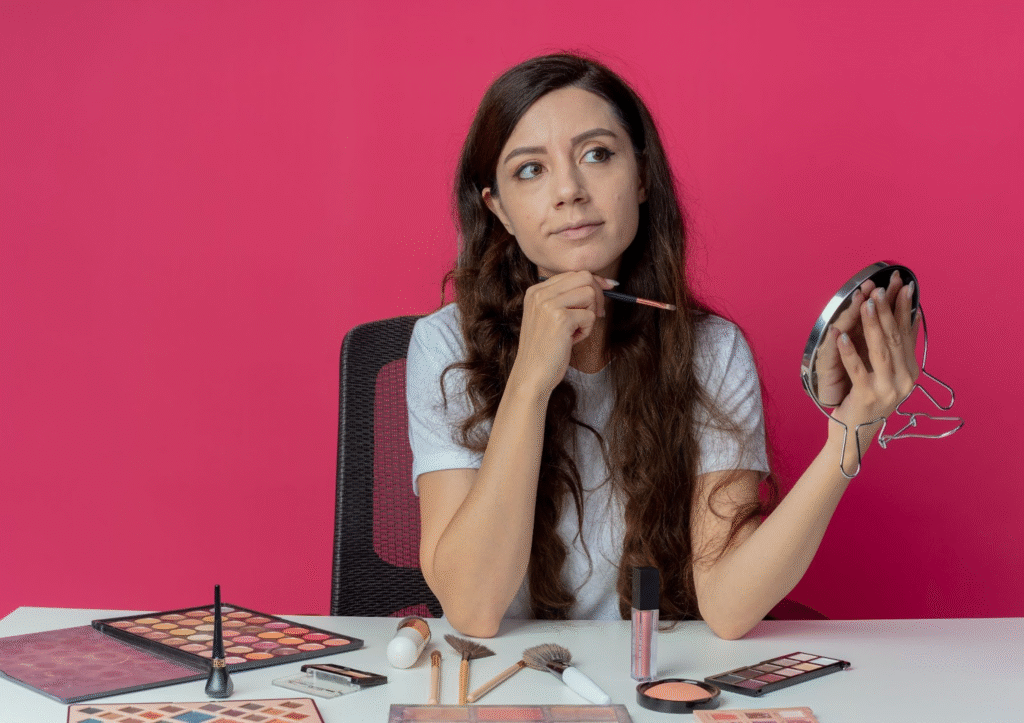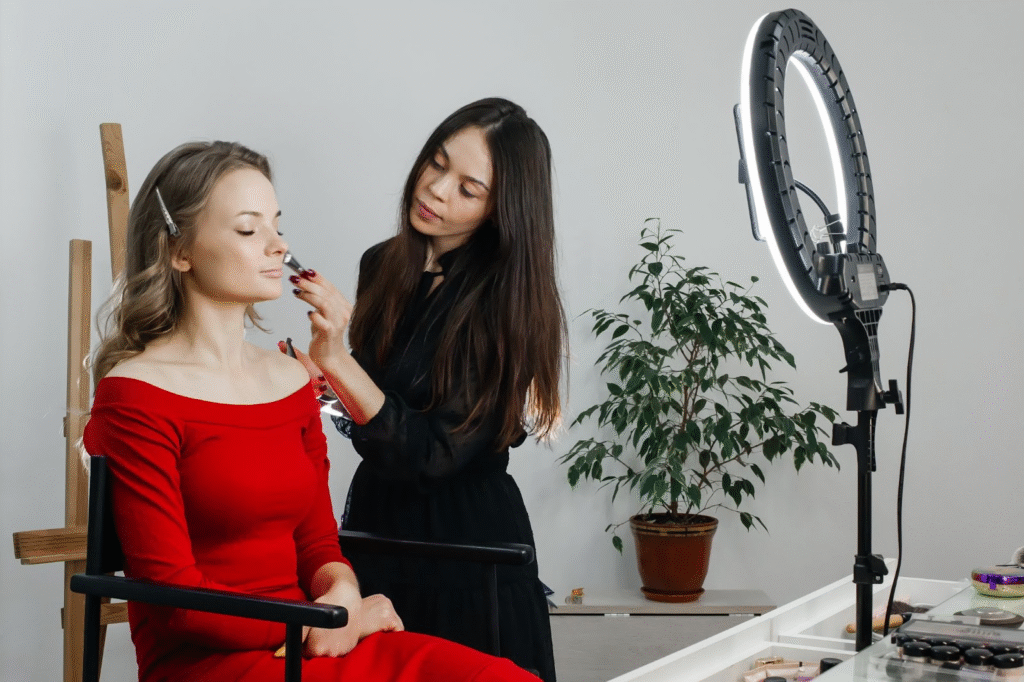One of the most common questions aspiring MUAs ask is “do you need a cosmetology license to be a makeup artist?”. The truth is that a license is generally required to work professionally. However, the answer also depends on various factors including where you live, what kind of services you offer, etc. In this blog, we’ll explore all you need to know about MUA licensing requirements. Let’s get started!

Do You Need a Cosmetology License to Be a Makeup Artist?
In some states, you need a cosmetology or esthetician license to perform makeup services independently. In others, a makeup artist certification or permit may suffice.
No matter where you live, you should also take into consideration what your plans are for the future. For example, if you’re planning on working in a salon that offers full-scope beauty services such as skincare or hair styling, having a cosmetology license is not only necessary but also much more beneficial.
Understanding your state’s makeup artist license requirements is essential to ensure you work legally and avoid fines or closures.

Makeup Artist License Requirements By State
A makeup artist license or permit is an official authorization that allows you to perform makeup services professionally. However, unlike cosmetology licenses, dedicated makeup artist licenses are not universally required or even offered in every state.
Instead, in many areas makeup artist licensing falls under broader cosmetology or esthetics regulations.
States that require a license will generally demand that you complete a specific number of training hours and pass a licensing exam during which you will demonstrate your proficiency and knowledge of techniques, safety and sanitation.
This protects your future clients and proves that you maintain professional standards during your work.
If your state requires a cosmetology or esthetician license to perform makeup professionally, you’ll need to meet those requirements before legally offering MUA services.
| State | Licensing Requirement for Makeup Artists | Notes |
| California | Requires a Cosmetology or Esthetician License for makeup services | Strict regulations. Makeup artists typically must hold a cosmetology or esthetics license to work legally. |
| New York | No separate makeup artist license. Cosmetology or Esthetician license often required | Freelancers may operate without a license but licensed cosmetologists have more opportunities. |
| Texas | Cosmetology license required to perform makeup professionally | Esthetics license does not cover makeup application; cosmetology license preferred. |
| Florida | No specific makeup artist license. Cosmetology or esthetics license required for salons | Freelance MUAs often operate with certification but salons require licensed professionals. |
| Illinois | Cosmetology or Esthetician license required for makeup services | State regulates makeup as part of cosmetology/esthetic services. Licensing is essential. |
| Georgia | No specific makeup license. Cosmetology or esthetician licenses cover makeup | Certification programs common; license preferred for expanded services. |
| Washington | Cosmetology license required for professional makeup services | Makeup artists working in salons need a cosmetology or esthetics license. |
| Arizona | Cosmetology license required for makeup services | State considers makeup application under cosmetology licensing laws. |
| Wisconsin | Cosmetology license required for makeup services | Makeup application is regulated under cosmetology licensing; esthetician license may be applicable depending on services. |
The Role of a Cosmetology License for MUAs
Most professional MUAs hold a cosmetology license, as this is one of the most comprehensive and credible credentials in the beauty industry. This license certifies your ability to provide a variety of services legally and safely.
Whether you’re interested in offering services in hair, nails and skincare too or you’re only aiming to become a makeup artist, holding a cosmetology license offers several advantages.
- Your service pool is larger. You can offer makeup plus hair styling, facials and more. This will turn you into a more versatile professional, helping you attract a larger client base.
- Naturally, both clients and employers often trust licensed cosmetologists more. Holding a license can open doors to high-end salons, bridal work and even TV/film gigs where specialty services are more often required.
- A license will always ensure you comply with local laws, avoiding penalties and building a reputable business.
👉 At Cosmetology & Spa Academy, we offer a thorough cosmetology program that prepares students for their real-world careers and their licensing exams.

Makeup Artist Certification vs. Cosmetology License: What’s the Difference?
If you’re primarily interested in makeup artistry, you may wonder whether a shorter makeup artist certification program could be a better fit than full cosmetology training.
Here’s how they compare:
| Aspect | Makeup Artist Certification | Cosmetology License |
| Duration | Weeks to months | Several months to a year |
| Curriculum Focus | Makeup techniques, product knowledge, client consultations | Makeup + hair, nails, skincare, sanitation, business |
| Legal Scope | Limited to makeup application only | Full range of beauty services allowed |
| Cost | Slightly lower tuition | Higher tuition |
| Career Opportunities | Freelance, bridal, fashion TV/film makeup artist | Salons, spas, freelance, multi-service professional |
Both paths have their own value depending on your goals. A certification can get you started quickly in makeup artistry, however a cosmetology license offers broader career flexibility.

How to Become a Makeup Artist
At this point, you’re probably asking yourself “what steps do I need to take to become a makeup artist?”. Here’s a quick guide:
1. High School Diploma or Equivalent
In most states, you must have a high school diploma or GED to become a MUA.
2. Cosmetology / Esthetics School / MUA Certification
As mentioned before, most makeup artists choose to attend an accredited cosmetology school, esthetics program or makeup artist training program. During your studies you will acquire specialized knowledge on different makeup application techniques and more.
3. Licensing Requirements
Licensing requirements vary, so check your state board of cosmetology for specific rules.
4. Specialized Makeup Training
The beauty industry is very competitive. New styles, techniques and trends are always emerging, so it’s important that you stay on top of any new developments.
Therefore, many makeup artists choose to pursue additional courses or certifications in specialized areas like:
- Airbrush makeup
- Special effects (SFX)
- Bridal and event makeup
- High-definition (HD) makeup for film and television
5. Build a Portfolio
As it is the case for most creative professions, having a strong portfolio is essential for your success. Always make sure to document your work with high-quality photos.
Record your progress and highlight your skills. This will also help you stand out when applying for new jobs in the future or freelance gigs.
6. Network & Market Yourself
In many cases, success also depends on building connections. This is why pursuing education at an accredited cosmetology school helps you gain an advantage, since you’ll be in contact with industry experts, instructors and other peers.
Try to join professional associations, collaborate with models, photographers, etc., and create your own social media presence.

Freelance Makeup Artist Legality: What You Need to Know
One of the most appealing aspects of working as a MUA is the fact that you can choose to work freelance. However, to be successful in this path it’s important to properly understand the legal landscape and operate safely.
Before starting your new career as a freelance makeup artist, consider these key factors:
- Business licensing: Many cities require a business license or permit to operate legally.
- Liability insurance: Protect yourself and your clients by securing proper insurance.
- Sanitation compliance: It’s absolutely crucial that you follow all health regulations to avoid penalties and keep your clients safe.
- Work Location: Some states require licensed professionals to work only in licensed salons or studios, so check local rules if you plan to work independently!
Why Choose Cosmetology & Spa Academy for Your Beauty Education?
With over 30 years of industry experience, Cosmetology & Spa Academy offers comprehensive training programs tailored to your own unique career goals.
We prioritize not just your education but your growth into a confident, skilled beauty professional.
Ready to start? Book a tour or contact us at info@csa.edu or 815-455-5900 at our Crystal Lake, Elgin, Rockford, or Schaumburg campuses.



















